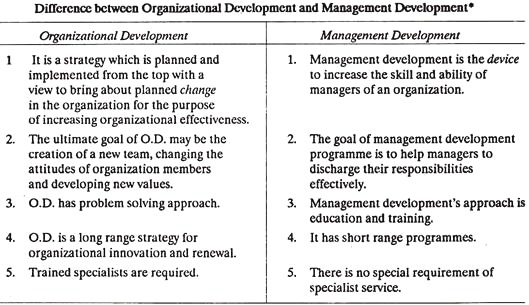After reading this article you will learn about:- 1. Meaning of Organizational Development (O.D) 2. Objectives of Organisational Development 3. Characteristics 4. Steps.
Meaning of Organisational Development (O.D):
Organisational (or organization) Development or simply O.D. is a technique of planned change. It seeks to change beliefs, attitudes, values and structures-in fact the entire culture of the organization—so that the organization may better adapt to technology and live with the pace of change.
O.D. is a comprehensive strategy for organization improvement. O.D. is a long range effort to improve an organization’s problem solving and renewal processes, particularly through a more effective and collaborative management culture.
R. Beckhard defines O.D. as a change strategy which is:
(i) Planned.
(ii) Organization-wide.
(iii) Managed from the top to increase organization effectiveness and health through planned interventions in the organization’s processes, using behavioural science knowledge.
Objectives of Organisational Development:
(a) Improvement in the performance of the organisation.
(b) Improvement in the ability of the organisation to adapt to its environment, and
(c) Improvement in inter-personal and inter-group behaviour to secure team work.
Characteristics of Organisational Development:
1. Organisational development is an educational strategy for bringing a planned change.
2. It is related to real problems of the organisation.
3. Laboratory training methods based on experienced behaviour are primarily used to bring change.
4. O.D. uses change agent (or consultant) to guide and affect the change. The role of change agent is to guide groups towards more effective group processes rather than telling them what to do. Change agents simply assist the group in problem solving processes and the groups solve the problems themselves.
5. There is a close working relationship between change agents and the people who are being changed.
6. O.D. seeks to build problem-solving capacity by improving group dynamics and problem confrontation.
7. O.D. reaches into all aspects of the organization culture in order to make it more humanly responsive.
8. O.D. is a long term approach (of 3 to 5 years period) and is meant to elevate the organization to a higher level of functioning by improving the performance and satisfaction of organization members.
9. O.D. is broad-based and describes a variety of change programmes. It is concerned not only with changes in organizational design but also with changes in organizational philosophies, skills of individuals and groups.
10. O.D. is a dynamic process. It recognises that the goals of the organization change and hence the methods of attaining them should also change.
11. O.D. utilizes systems thinking. It is based on open, adaptive systems concept. The organization is treated as an interrelated whole and no part of the organization can be changed without affecting other parts.
12. O.D. is research based. Change agents conduct surveys, collect data, evaluate and then decisions are taken.
13. O.D. uses group processes rather than individual process. It makes efforts to improve group performance.
14. O.D. is situational and contingency oriented.
15. Organization Development and Management Development are complementary rather then conflicting.
Steps in Organisational Development (O.D):
Lawrence and Lorsch have provided the following steps in organisational development:-
1. Problem identification—Diagnosis:
O.D. program starts with the identification of the problem in the organisation. Correct diagnosis of the problem will provide its causes and determine the future action needed.
2. Planning Strategy for Change:
O.D. consultant attempts to transform diagnosis of the problem into a proper action plan involving the overall goals for change, determination of basic approach for attaining these goals and the sequence of detailed scheme for implementing the approach.
3. Implementing the Change:
O.D. consultants play an important role in implementing change.
4. Evaluation:
0. D. is a long-term process. So there is a great need for careful monitoring to get process feedback whether the O.D. programme is going on well after its implementation or not. This will help in making suitable modifications, if necessary. For evaluation of O.D. programme, the use of critic sessions, appraisal of change efforts and comparison of pre- and post-training behavioural patterns are quite effective.
